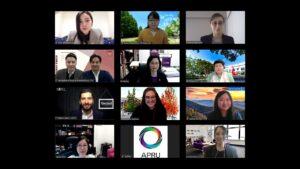
APRU Co-curricular programs have proven a valuable and accessible resource for international exchange during Covid-19 distancing restrictions. By offering virtual student exchange experiences not typically found in a virtual learning environment, such as, Sake Tasting, Music Jam, Tour of the Galapagos Islands, Career workshops, K-pop music history, Global Leadership, Cooking classes, (and much more) the APRU VSE demonstrates the value of the program by giving students an entryway to study abroad experiences and giving all students a chance to study abroad regardless of their economic resources.
First-hand lessons which universities have drawn from hosting co-curricular courses in the APRU Virtual Student Exchange program was highlighted at a webinar hosted by the Chinese University of Hong Kong on April 16th entitled, International Exchanges Unbound: Developing Co-curricular Programs to Support Virtual Mobility. The webinar came against the backdrop of COVID-19 persistently restricting travel between campuses, with the presenters explaining how virtual student exchanges (VSE) can best be conducted.
“The program allows students to keep benefitting from the very extensive academic courses in our network despite all the travel restrictions,” said Professor Suk-ying Wong, the Chinese University of Hong Kong’s Associate Vice-President, in her opening remarks.
“Students are able to experience how virtual visits of other campuses can be done meaningfully and how they can take home the same kind of cultural experiences they would have when physically visiting,” she added.
Lessons from Leading Universities
The webinar involved presentations by The Hong Kong University of Science and Technology, Korea University, Tohoku University, Universidad San Francisco de Quito (USFQ), and University of California, Davis. The case studies illustrated that a mix of live and pre-recordings works well, that dividing participants into smaller groups encourages more active engagement, and it is worth the investment of different technologies (Slido, etc). The presenters found it particularly important for organizers to consider how content might be relevant in different cultural contexts. Presenters furthermore pointed out that it is important to find ways to engage students after an event, and that an event should always be built on to increase relevance, including by creating a sequence of events with other APRU members and hosting programs in partnership with other universities.
The APRU Virtual Student Exchange program was launched in August 2020 with two offerings available, academic courses and co-curricular activities. With co-curricular offerings focus on cultural, leadership, career, and social aspects of study abroad experiences in virtual delivery the VSE program is able to provide a well-rounded virtual exchange experience. Reflecting the program’s significance, 42 co-curricular VSE programs have been offered by 13 universities by March this year, attracting more than 900 participants. The latest webinar, for its part, drew over one hundred concurrent views from over a dozen of economies.
“We have clearly seen that the the APRU Virtual Student Exchange program allows the sharing of experts knowledge, so that we can keep up with the time, especially during the pandemic,” said Raewyn Tan, the University of Auckland’s International Adviser, at the webinar’s Report Back session. “This is obviously very helpful for students planning for their carriers, and we will strive to make participation rates remain high,” she added.
Revisit the workshop recording:
More Workshop Article:
Tohoku University Be Global: APRU Virtual Student Exchange Workshop (from Tohoku University)
